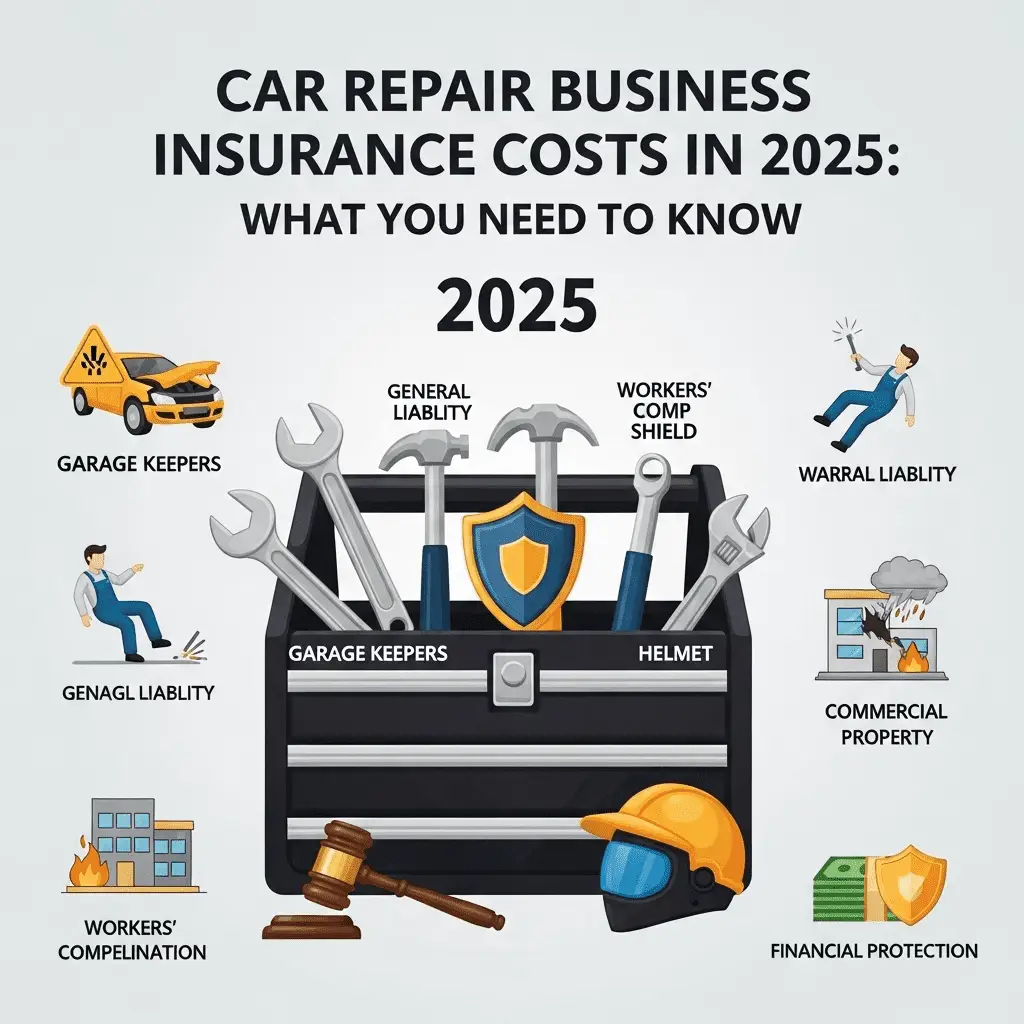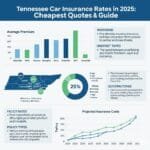You’ve worked hard to build your car repair business, and it’s growing! But with growth comes risk. You might have customers coming in and out, employees working with heavy tools, and a lot of valuable equipment. Every day, there’s a chance something could go wrong—like a customer’s car getting damaged, an employee slipping and getting hurt, or even a piece of equipment breaking down. These accidents can incur significant financial costs. Without the proper insurance, you could be left paying for everything yourself.
Imagine if a fire broke out in your shop, or if you were sued because a repair went wrong. These types of incidents can cost tens of thousands, or even hundreds of thousands of dollars. It’s scary to think about—but that’s where car repair business insurance comes in. Insurance is your safety net, protecting you and your business from financial disaster.
In this guide, we will break down everything you need to know about car repair business insurance in 2025. We’ll explain the costs, coverage options, and how to find the best insurance for your shop, so you can focus on what you do best: fixing cars!
What is Car Repair Business Insurance?
Car repair business insurance is a combination of different types of coverage designed to protect your business from risks. Think of it like a tool belt. Each type of insurance is a different tool that helps protect against specific problems that might happen in your shop. Whether it’s damage to a customer’s car, an employee injury, or a disaster like a fire, insurance can help cover those costs.
Here are some everyday situations where insurance can protect your business:
- The customer’s car gets damaged while it’s in your care.
- An employee gets hurt while using tools or working on a vehicle.
- A fire, storm, or other disaster can damage property.
- A customer sues you because of a mistake in the repair work.
Each of these scenarios could cost your business a lot of money. Without insurance, you could be left paying for these expensive bills out of your pocket.
But the good news is, the right insurance will help protect you and your business from these risks. You don’t have to carry the weight of everything yourself.
Why Do Car Repair Businesses Need Special Insurance Coverage?
Standard business insurance policies aren’t enough for car repair shops. The auto service industry has its own set of unique risks. That’s why you need insurance specifically designed for the work you do.
Here are a few examples of why car repair businesses need specialised insurance:
- Damage to Customer Vehicles:
When a customer leaves their car with you, you’re responsible for it. If something happens to their vehicle, like a tool falls on it or a fire breaks out, you could be held financially accountable. Garage Keepers Insurance is designed to cover this kind of risk.
- Accidents in the Shop:
What if a customer slips and falls on an oil slick? Or what if they’re injured while walking through your waiting room? If they sue you, general liability insurance can help cover the cost of medical bills, legal fees, and other expenses.
- Employee Injuries:
Mechanics work with heavy equipment, sharp tools, and hazardous chemicals. If one of your employees gets hurt on the job, workers’ compensation insurance covers medical expenses and lost wages. In most states, this type of insurance is required by law.
- Damage to Your Property:
Your equipment is the backbone of your business. If something happens to your tools or the building, you could face huge costs to replace them. Commercial property insurance helps cover these costs and ensures that your business can get back up and running quickly.
Without these specialised types of coverage, you would be personally responsible for any damages, injuries, or accidents. And the costs can quickly add up.
Factors That Affect the Cost of Car Repair Business Insurance
Insurance costs vary among car repair shops. The price you’ll pay depends on a variety of factors, including your location, the size of your shop, and the types of services you offer. Here are some of the key factors that determine your insurance premium:
1. Location of Your Shop
Where your shop is located has a significant impact on your insurance costs. Suppose your shop is located in a busy city with high traffic and crime rates. In that case, your premiums are likely to be higher compared to a quieter, rural area. Insurance companies look at local risks, such as weather patterns, theft rates, and even the cost of medical care in your area.
2. Number of Employees
The more employees you have, the higher your workers’ compensation insurance costs will be. This is because having more people in your shop increases the chances of an accident or injury. Insurers will also consider the total payroll when calculating your premium.
3. Services You Offer
Different types of car repairs come with other risks. For example, a shop that does simple oil changes and tire rotations is less risky than a shop that performs high-performance tuning or collision repair. The more specialised your services, the higher your premiums are likely to be.
4. Value of Your Tools and Equipment
Suppose your shop has expensive diagnostic tools, vehicle lifts, or other high-tech equipment. In that case, you’ll pay more to insure those items. The more valuable your tools are, the higher your property insurance costs will be.
5. Claims History
If your business has had many claims in the past, you’ll likely pay higher premiums. Insurance companies see businesses with a history of frequent claims as higher risks. To keep your premiums down, it’s essential to maintain a clean claims history.
6. Coverage Limits and Deductibles
The level of coverage you choose also affects your insurance costs. Higher coverage limits (the maximum amount your insurance will pay out) mean higher premiums. Similarly, if you choose a lower deductible (the amount you have to pay out of pocket before your insurance kicks in), your premiums will be higher.
How Much Does Car Repair Business Insurance Cost?
The average cost of insurance for a small to medium-sized car repair shop in 2025 is between $2,000 and $5,000 per year. Every month, most small shops can expect to pay between $150 and $400 for basic coverage.
However, the actual cost will depend on your business’s size, location, and the services you offer. Larger shops, with more employees and higher risks, can expect to pay more.
Types of Coverage and Their Impact on Costs
Car repair business insurance isn’t just one policy—it’s made up of several different coverages. Each coverage type is essential for protecting your business from specific risks.
Here are some of the key types of insurance you should consider:
1. General Liability Insurance
This is the most basic type of insurance and covers you for accidents or injuries that happen to third parties, like customers or vendors. Suppose someone slips and falls in your waiting room or gets hurt by a tool you’re using. In that case, general liability will cover the cost of medical bills and legal fees.
2. Garage Liability Insurance
This is a specialised form of general liability insurance for car repair businesses. It covers accidents and damages that happen on your property, such as if one of your employees accidentally damages a customer’s car while test-driving it.
3. Garage Keepers Insurance
This type of insurance is essential for any shop that services or stores customer vehicles. Suppose a customer’s car is damaged while it’s in your care. In that case, garage keepers insurance will help cover the costs of repair or replacement.
4. Workers’ Compensation Insurance
This is required by law in most states if you have employees. It covers the medical costs and lost wages of employees who get injured or sick on the job. It also protects you from being sued by injured workers.
5. Commercial Property Insurance
This insurance protects your property, including your building, equipment, tools, and furniture, from damage caused by fire, theft, or other disasters. If something happens to your tools or shop, commercial property insurance will help cover the costs of replacement or repair.
6. Business Owner’s Policy (BOP)
A BOP combines several types of coverage into one package. It usually includes general liability insurance, commercial property insurance, and business interruption insurance, making it a cost-effective option for small shops.
How to Lower Your Car Repair Business Insurance Costs
While insurance is a necessary expense, there are several ways to reduce your premiums and make it more affordable:
1. Bundle Your Policies
Many insurance companies offer discounts if you bundle multiple policies together. For example, you can combine general liability insurance with property insurance into a single Business Owner’s Policy (BOP) to save money.
2. Increase Your Deductible
Suppose you agree to pay a higher deductible (the amount you pay out-of-pocket before your insurance kicks in). In that case, you can lower your monthly premiums. Just make sure you have enough cash saved up to cover the higher deductible if you need to file a claim.
3. Maintain a Clean Claims History
Insurance companies reward businesses with a history of low claims. Keeping a safe and well-maintained shop can reduce the risk of accidents, which will help keep your premiums low.
4. Install Safety Features
Adding safety features like security cameras, alarms, and proper lighting can reduce the risk of theft and damage. Insurers may offer discounts for businesses that take steps to protect their property.
Is Car Repair Business Insurance Worth the Investment?
In short, yes—car repair business insurance is worth every penny. While it may feel like an extra cost, it’s an investment in your business’s future. One major accident or lawsuit could wipe out everything you’ve worked hard to build. Insurance protects you from these financial disasters, ensuring that your business can recover quickly.
Conclusion: Protecting Your Business in 2025
In 2025, running a car repair business without the right insurance is risky. The costs of accidents, damage, and lawsuits can quickly add up. Still, with the right coverage, you can protect your business from these financial risks.
By understanding your insurance needs, shopping around for the best deals, and reviewing your coverage regularly, you can ensure that your car repair shop stays protected—and stays in business—for years to come.





